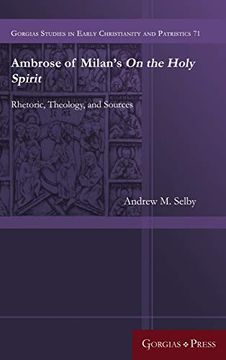Share
Ambrose of Milan's on the Holy Spirit: Rhetoric, Theology, and Sources (Gorgias Studies in Early Christianity and Patristi) (in English)
Andrew M. Selby (Author)
·
Gorgias Press
· Hardcover
Ambrose of Milan's on the Holy Spirit: Rhetoric, Theology, and Sources (Gorgias Studies in Early Christianity and Patristi) (in English) - Andrew M. Selby
$ 166.32
$ 225.71
You save: $ 59.40
Choose the list to add your product or create one New List
✓ Product added successfully to the Wishlist.
Go to My WishlistsIt will be shipped from our warehouse between
Monday, May 06 and
Tuesday, May 07.
You will receive it anywhere in United States between 1 and 3 business days after shipment.
Synopsis "Ambrose of Milan's on the Holy Spirit: Rhetoric, Theology, and Sources (Gorgias Studies in Early Christianity and Patristi) (in English)"
One might expect that the first pro-Nicene defense of the divinity of the Holy Spirit written in Latin, which influenced the theology of Augustine of Hippo, would be lauded. However, Ambrose of Milan's On the Holy Spirit typically has been maligned. Jerome was the first, proclaiming it to be badly written and plagiarized. Modern scholars have largely followed that judgement. This study contradicts this perspective, claiming that Ambrosedefines the Holy Spirit in a way consistent with pro-Nicene theology using classical Ciceronian rhetoric to interpret Scripture in a quasi-judicial situation: Emperor Gratian played the role of judge, the Homoians served as the prosecution, and Ambrose was the defendant. Instead of viewing Ambrose's On the Holy Spirit through the lens of source-criticism, this study utilizes classical rhetorical theory, especially stasis theory, as a methodology that gives due weight both to the conflict in which Ambrose was embroiled and the bishop's pro-Nicene theological reasoning. Stasis theory helped the rhetorically educated to generate the relevant arguments for the case before them. After documenting the ecclesiastical-political conflict that occasioned On the Holy Spirit's composition, this study provides the first comprehensive account of the pneumatology of Ambrose's opponents, the Latin Homoians. Ambrose's own intellectual formation is then investigated, revealing his intimate knowledge of rhetoric and his acquaintance with some philosophical doctrines, both of which factored into the genesis of On the Holy Spirit. Rhetorical analysis of the text uncovers Ambrose's attention to the concerns--theological and political--of his primary audience, the Emperor Gratian. Ambrose used Greek sources, but selected ideas which helped him craft his case. Finally, it is demonstrated that Ambrose used the "definition issue" in stasis theory to understand the Holy Spirit's identity, interpreting Holy Scripture to discover his differentiaefrom creatures but also his shared propriawith the Father and the Son. A lengthy appendix helps advance our understanding of the extent and character of Ambrose's borrowing from Greek sources. Not only does this study provide the first full study of Ambrose's On the Holy Spirit, but it also suggests that rhetorical theory significantly influenced argumentation in fourth-century Trinitarian controversies.

